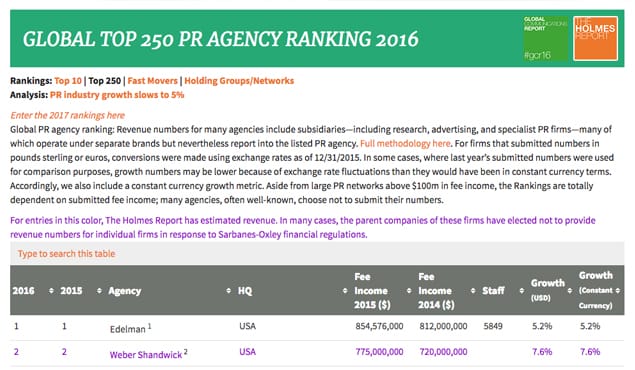Public relations companies can be very beneficial for certain types of companies. They’re most effective when you’re a new startup with a hype new product, someone getting on the cutting edge of an industry with a new growth hack, or an established business with a new product launch on the horizon. The idea, of course, is to have something new that they PR firm can use as ammunition to get you press.
So how does a PR firm do its stuff? Let’s investigate.
What a PR Firm Is
Public relations agencies are companies that specialize in a particular kind of marketing. They don’t manage advertising for you. They don’t buy billboard space or TV commercials. They don’t do research to come up with catchy buzz phrases for you. You have to find a marketing agency for all of that.
PR firms work via editorial coverage. They provide you with “earned” media, coverage on websites, newspapers, magazines, and occasionally TV programs that look for trending sources rather than paid sources. You won’t get a sponsored spot on ESPN, but you might get coverage on CBS Sunday Morning.
The goal of a PR firm is pretty simple. You pay them, and they use their connections, their resources, and their expertise to get you coverage on as many different relevant sources as possible.
This is distinct from advertising primarily because PR coverage doesn’t need to be disclosed. When someone in a high profile position on Forbes writes about using your service or being hyped about it coming out, other people will take notice. When there’s a big banner ad promoting your soon-to-be-released product, people understand that it’s paid advertising and take it with a grain of salt.
In a way, PR is very similar to influencer marketing. The primary difference is that with influencer marketing, you’re working to get the notice of the influencer and get them to promote you or mention you in a public space. With PR, they have connections to the influencers already and can get you that mention without needing to struggle for it.
There’s an organization called the Public Relations Society of America. It’s not made up of superheroes or their press teams, as cool as that would be. No, it’s made up of PR agencies, companies, firms, and consultants that help define what PR is, how it works, what’s acceptable, and what isn’t. They have their own definitions of what PR is:
- PR management involves anticipating and interpreting public opinion and attitudes on issues that might impact, positively or negatively, perception of your organization or the efficacy of your plans.
- PR management companies provide counseling to management at all levels for policy decisions and possible courses of action and how they might impact, or be impacted by, public perception or opinion. In other words, they tell you what the possible ramifications of your decisions may be.
- PR management companies research and evaluate techniques and courses of action you can take that can improve public perception, including everything from marketing and financial decisions to employee benefits, community relations, and other programs.
- PR management firms take your decisions and their expertise combined and implement efforts to change public opinion or policy. This can involve everything from budgeting to training staff, and anything else needed to support the above.
So how do they go about doing all of this? The tools will seem familiar to marketers. PR firms write speeches, create press releases, write pitches for journalists, create special events, perform market research, grow business networks through brand and personal connections, and more. They also can manage blogs, though often they prefer external blogging like guest posts more than being a blog management outsourcer for your site. They will also plan for potential crises and how to respond, and can deal with negative reviews delivered on social media.
The PR Process
When you hire a PR firm, the first thing they’re going to do is take a complete inventory of your brand. They’ll ask you a million questions, about what resources you have, what employees you have, what your products are and do, what marketing you have going and what you’ve done in the past, basically anything that can relate to your public opinion.
In particular, the PR firm will concentrate on your marketing, including your resources when it comes to editorial connections, influencer networking, and public perception. They’ll identify accounts on sites like the Yellow Pages or Yelp that might be relevant to you, and claim them if you haven’t done so already. They will analyze your social media presence and figure out what you have going for you.
All of this will feed into their engine of experience, which will figure out where you stand and in what areas you need improvement. They’ll find noteworthy negative reviews and negative public opinion, and they’ll figure out what you need to do to counter it. In some cases, this will involve a campaign of positive review solicitation, customer service, and removal of bad reviews where possible. In other cases, it might involve making actual changes to your product or your business processes, in order to address the issues that cause the problems.
This is one thing people underestimate when they hire a PR firm. Many people think they’ll basically be buying a link package, but the reality is much more intense. If you’re looking for a shortcut to better public opinion, particularly if you’re trying to avoid making costly but beneficial changes to your product, you’re not going to get what you want out of most PR firms.
That’s not to say there aren’t PR companies that basically just offer backlink packages. These exist, but the problem is, they tend to be overpriced for what little value they provide. Rather than analyze the problem and provide methods you can use to solve it, they try to override negative public opinion by spamming positive opinion anywhere they can. They use private blog networks, bot accounts, and other shady techniques just to try to scam public perception of your business.
The problem with this should be obvious; it’s obvious. People can pretty easily tell when fake reviews are trying to flood out good, negative reviews, and it’s always recognizable when a shady PR firm is trying to manipulate public opinion without knowing how to really do it. The end result is an even worse perception of your business and a lot of wasted time and money.
The real secret for how PR firms do what they do tends to simply be “connections.” They know people, or they know people who know people, and they are kinds with the networking game. However, every PR firm has their own method of telling the story of a brand, and they all have their own sets of connections. Different brands will work better with different firms, so there’s no one recommendation I can give. I can, however, give you tips for finding the right PR firm.
Hiring the Right Company
The first thing you want to do is filter down the list of potential PR firms by size. If you’re a small team startup with very little to your name, you’re not going to be able to hire the PR firm that works with Pepsi. You’re more likely to get a small firm or a freelance consultant to do the work for you. They won’t have as large a network of resources to help you, but neither do you need such overkill. Plus, it’s more cost-effective to go small whenever you can.
The second thing you should do is find PR firms that specialize in your industry. If you’re a musician trying to build a presence, you don’t want to hire someone who works primarily with clothing companies. If you’re a company producing internet-connected household items, you don’t want someone who works largely with bands.
Perhaps more importantly, you want someone who does more than just works with an industry; you want someone passionate about it. The more they know and love the industry, the better they will be at judging public opinion, seeing the deep value of what you bring to the table, and figuring out just the right way to leverage it all together.
Next, you want to make sure the PR agency you’re investigating has access to the kinds of press that matter. If you’re a tech startup, chances are most of your audience is reading blogs and listening to podcasts. They’re probably not reading journals or trades. TV might or might not be a valid option. There are all sorts of media methods a PR firm might use, but you need to find one that specializes in the media your audience consumes. It does you no good to produce a TV commercial when most of your audience doesn’t watch TV.
You should also check into the locality of the PR firm. There are a lot of global or national firms that work with anyone who comes their way, but there are also a lot of firms that will only work with people in their local area. If you’re a small business that really only serves people in your city, it would help to have a PR firm based in that city, who knows the area, knows the people, and knows the local concerns. Hiring someone from a big fancy city to come in and tell you how to run your small town business is just going to fall flat.
Finally, when you’re narrowing down the field to a few select agencies, you should talk to someone representing each of them. At the end of the day, the thing you really need is a personality fit. They need to get you, you need to get them, and the mutual understanding will be the foundation for working together smoothly and in a beneficial way. It doesn’t matter what kind of accolades a company has; if you’re going to hate calling them when it comes time for a chat, they aren’t going to work out.
Doing Without
PR companies can be expensive, and at a small business level, they might not necessarily bring much to the table. Obviously, they have experience and connections, but a lot of what they do is just careful study of your audience and your existing connections. You can work to leverage those on your own, and save the money you would have invested in the public relations company on its own.
The first step for public relations on a DIY level is to audit what you have going for you. What do you have to offer your audience? Who is your audience in the first place? What are your goals with PR? What is your current public perception?
All of this will help you figure out where you are, and you can use that as a foundation to figure out where you’re going. What are your goals in the short term, in the long term, and overall? What would it take to call your outreach a success?
Then you need to inventory your connections and who they might be able to connect you to for a beneficial arrangement. What influencers can you reach, through a friend of a friend? Who can give you a good word or get you the ear of an editor? These are always tricky connections to map, but keeping notes can help.
Finally, you need to actually do your outreach. It should be fine, though; it’s just marketing. Write your guest posts, write your press releases, buy your air time, and pitch your product. As long as you’re reaching the right people in the right way, you can do without hiring a PR firm, at least right away. Save that for when you have more of a budget and more resources to work with.
 ContentPowered.com
ContentPowered.com








